Pascal
Boyer
|
B O O K S and edited collections |
 |
Minds Make Societies How Cognition Explains the Worlds Humans Create Forthcoming: New Haven, CT, Yale University Press, 2018. LINK “There is no good reason why human societies should not be described and explained with the same precision and success as the rest of nature.” Thus argues evolutionary psychologist Pascal Boyer in this uniquely innovative book. Integrating recent insights from evolutionary biology, genetics, psychology, economics, and other fields, he offers precise models of why humans engage in social behaviors such as forming families, tribes, and nations, or creating gender roles. “The best
book yet on one of the deepest issues in our
understanding of ourselves—how the intellectual
contributions of individual people shape the
cultures of societies. Pascal Boyer is a pioneer
in this landscape and explores it with insight
and precision.” — Steven Pinker, Johnstone
Professor of Psychology, Harvard University, and
author of How the Mind Works and Enlightenment
Now.
“Minds
Make Societies is the most important work
on a science of human culture in years. If the
best ideas win, this scholarly tour-de-force
will become must-reading for everyone interested
in how society works.” — Leda Cosmides,
Co‑Director, Center for Evolutionary Psychology,
University of California, Santa Barbara. |
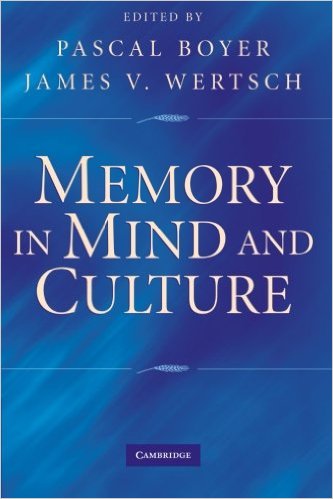 |
Memory In Mind and Culture Edited by Pascal Boyer and James V Wertsch New York, NY: Cambridge University Press, 2009. Contents: What Are Memories For? Functions Of Recall in Cognition & Culture, P Boyer The Role of Repeated Retrieval in Shaping Collective Memory, H Roediger, III, F. M. Zaromb, & A. C. Butler Specificity in Memory, Dan Schacter, A. Gutchess & E. Kensinger Networks of Autobiographical Memories, H. L. Williams & M. A. Conway Making History: Social and Psychological Processes Underlying Collective Memory, J. W. Pennebaker and A. Gonzalez Cultural Life Scripts and Individual Life Stories, D. Berntsen & A. Bohn Historical Memories, C. W. Blatz and Michael Ross How Does Collective Memory Create A Sense of the Collective?, A. Lambert, L. Nesse, C. Rogers & Larry Jacoby Collective Memory, J. V. Wertsch The Memory Boom: Why and Why Now?, David W. Blight Historians and sites of memory, Jay Winter Oral traditions as collective memories: Implications for a general theory of memory, David C. Rubin Cognitive Predispositions and Cultural Transmission, Pascal Boyer. |
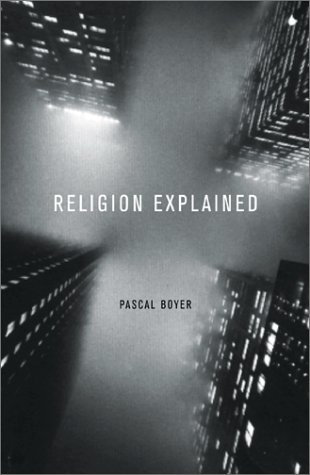 |
Religion Explained The Evolutionary Foundations of Religious Belief Random House (UK) and Basic Books (USA), 2001 The main theme of this book is that we now have a better understanding of religious representations, their causes and their role in human cognition, simply because we have a better and more precise understanding of the mind-brain, its evolution, its structure and its specific dispositions. Theme[From Chapter 1] The explanation for religious beliefs and behaviours is to be found in the way all human minds work. I really mean all human minds, not just the minds of religious people or of some of them. I am talking about humanminds because what matters here are properties of minds that are found in all members of our species with normal brains. The discoveries I will mention here are about the ways minds in general (men's or women's, British or Brazilian, young or old) function. [...] This may seem a rather strange point of departure if we want to explain something as diverse as religion. Beliefs are different in different people; some are religious and some are not. Also, obviously, beliefs are different in different places. Japanese Buddhists do not seem to share much, in terms of religious notions, with Amazonian shamans or American Southern Baptists. How could we explain a phenomenon (religion) that is so variable in terms of something (the brain) that is the same everywhere? This is what I describe in this book. |
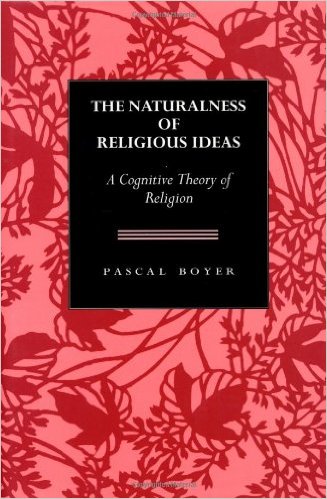 |
The Naturalness Of Religious Ideas Berkeley: University of California Press, 1994. Publisher's blurb: "Why do people have religious ideas? And why thosereligious ideas? The main theme of Pascal Boyer's work is that important aspects of religious representations are constrained by universal properties of the human mind-brain. Experimental results from developmental psychology, he says, can explain why certain religious representations are more likely to be acquired, stored, and transmitted by human minds. Considering these universal constraints, Boyer proposes an exciting new answer to the question of why similar religious representations are found in so many different cultures." |
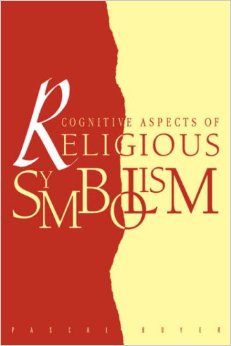 |
Cognitive Aspects of Religious Symbolism Edited by Pascal Boyer. Cambridge: Cambridge University Press, 1992. Cognitive Aspects of Religious Symbolism, Pascal Boyer Whither Ethnoscience?, Scott Atran Computational Complexity in te Modelling of Cosmological Ideas, Janet Keller & FK Lehman "Earth" and "Path" as Complex Categories: Semantics and Symbolism in Kwaio culture, Roger Keesing Domain-specificity, Living Kinds and Symbolism, Maurice Bloch Pseudo-Natural Kinds, Pascal Boyer Sign into Symbol, Symbol as Sign: Cognitive Aspects of a Social Process, Christina Toren Talking about Souls. The Pragmatic Construction of Meaning in Cuna Ritual Language, Carlo Severi Cognitive Categories, Cultural Forms and Ritual Structures, E Thomas Lawson The Interactive Basis of Ritual Effectiveness in a Male Initiation Rite, Michael Houseman. |
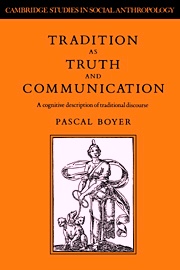 |
Tradition As Truth And Communication Cambridge: Cambridge University Press, 1992. Publisher's blurb: "Tradition is a central concept in the social sciences, but it is commonly treated as unproblematic. Dr. Boyer insists that social anthropology requires a theory of tradition, its constitution and transmission. He treats tradition as a type of interaction which results in the repetition of certain communicative events, and therefore as a form of social action. Tradition as Truth and Communication deals particularly with oral communication and focuses on the privileged role of licensed speakers and the ritual contexts in which certain aspects of tradition are characteristically transmitted. Drawing on cognitive psychology, Dr. Boyer proposes a set of general hypotheses tested by ethnographic field research." |